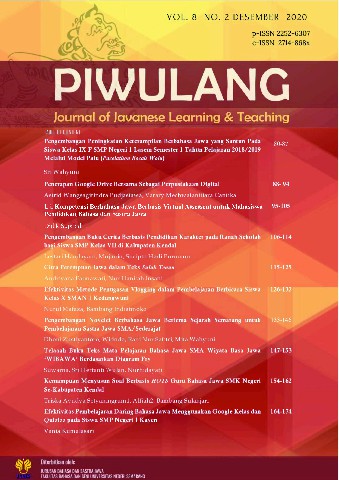Efektivitas Metode Penugasan Vlogging dalam Pembelajaran Berbicara Siswa Kelas X SMAN 1 Kedungwuni
##plugins.themes.academic_pro.article.main##
Abstract
This study aims to 1) find out the differences in Javanese language speaking skills in groups of students who are treated using the vlogging assignment method with groups of students who only use the conventional method or without the vlogging method. 2) find out the effectiveness of learning using the vlogging method to the learning outcomes of Javanese speaking skills in class X students of SMAN 1 Kedungwuni. This research is quasi-experimental research. The research data were obtained from quantitative and qualitative data, namely interviews and test results. The data analysis technique used a t-test, distribution normality test, and variant homogeneity test. The validity of the study was obtained based on expert judgment. The results of this study indicate that 1) there are differences in learning outcomes of Javanese language speaking skills in groups of students who are treated using vlogging assignments with groups of students who only use conventional methods. In the post-test, the mean value of the experimental class students taught by using the vlogging assignment method was 84.61, the value was greater than the average control class result of 77.89. 2) the vlogging assignment method is more effective in improving the Javanese language speaking skills of class X students of SMAN 1 Kedungwuni. The effectiveness of the vlogging assignment method is proven through the t-test on the pre-test and post-test scores of the experimental and control groups. The difference in the average value of pre-test and post-test in the experimental class. is higher in the experimental class that is equal to 21.44> 14.89 in the control class. These results indicate that the experimental group with the vlogging method is more effective in improving students' Javanese speaking skills.
##plugins.themes.academic_pro.article.details##
References
Depdiknas. 2004. Pelayanan Profesional Kurikulum 2004. Standar kompetensi Mata Pelajaran Bahasa Indonesia. Jakarta: Departemen Pendidikan Nasional.
__________2004. Pelayanan Profesional Kurikulum 2004. Penilaian Kelas. Jakarta: Departemen Pendidikan Nasional.
Djiwandono, MS. 1996. Tes Bahasa dalam Pengajaran. Malang. Penerbit ITB.
Hadi, Sutrisno. (1985) Metodologi Research Jilid 4. Yogyakarta: Yayasan Penerbit Fakultas Psikologi UGM.
Sari, Shinta Prasetya. 2015. “The Use of Videos to Improve The Students’ Speaking Skills At Class VII B Of SMPN 2 Patuk in the Academic Year of 2014/2015â€. Thesis. Yogyakarta: Universitas Negeri Yogyakarta.
Suparno. 2000. Mutu Pengajaran Bahasa Indonesia di Sekolah. Malang: IKIP Malang.
Watkins, Jon 2012. “Increasing Student Talk Time Through Vloggingâ€. Language education in asia Vol 3 No. 2. 2012. Kwansei Gakuin University. Hyogo. Japan.
